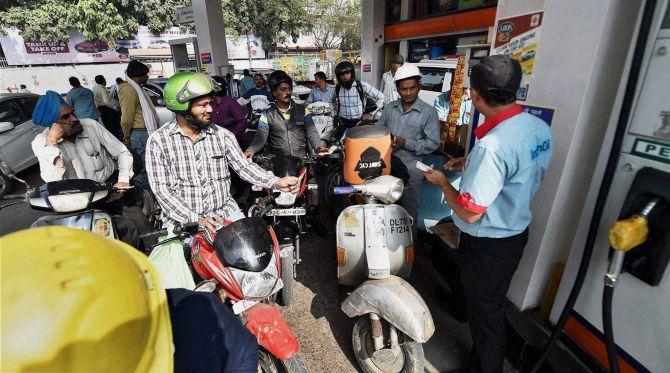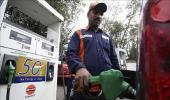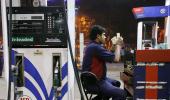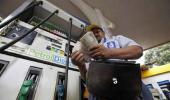'Oil companies like IOC, BPCL and HPCL have to set up world class systems where they are always two steps ahead of the crooks,' says Sudhir Bisht, a veteran of the petroleum industry.

Nine years ago, in the days when oil companies were experimenting with technology to counter the menace of adulteration and under-delivery of petrol and diesel at fuel stations, I wrote in Rediff on How not to be cheated at the petrol pump, which received nearly one hundred comments, proving its popularity.
Many Indian Oil, Bharat Petroleum and Hindustan Petroleum stations were then being upgraded, with old dispensing pumps at the forecourt being replaced by multi-product dispensers, MPDs.
It was believed that since the MPD's electronic technology completely controlled the mechanical components, they were less vulnerable to manipulation.
It is well known that till technology made its impact felt in the fuel retail sector, a sizeable number of unscrupulous dealers, in active connivance with some dishonest field level technicians and oil company officers, were able to under-deliver fuel and thereby cheat customers.
I had hoped that with the arrival of the MPDs, the ITI-trained field technicians would not be able to tamper with the machinery, and the issue of cheating by under-delivery would be obliterated.
Since the turn of this century, the public sector oil companies, which operate about 52,000 petrol stations in India, have been implementing limited to full-scale automation at their petrol stations.
Oil company officials were now able to monitor the fuel density of underground fuel tanks in petrol stations.
With the advent of automation at fuel stations and networking of stations with some kind of information centre, the oil companies were able to monitor key activities at petrol pumps.
At least, that was the impression I carried with my limited informal interaction with some of the stakeholders in the oil industry.
All these developments had led me to believe that the era of malpractices at the fuel forecourt was truly over -- that is until the recent raids on petrol pumps by the Uttar Pradesh police's special task force, which opened my eyes.
The dealers who were dishonest had not only found new means of cheating the customers, they had in fact also built a shield around them which made it impossible to catch them.
The dealers no longer depended on the oil companies' field level technicians to manipulate their pump gears.
They had bought the services of technocrats who were able to invent a chip that could remotely control the behaviour of fuel pumps.
The dealers were thus able to charge for fuel that showed on the pump meter, but were actually delivering up to 6% less oil.
Let me take the example of a state where the average monthly sale at petrol pumps is 270,000 litres of petrol.
A 6% under-delivery would translate to 16,000 litres of petrol saved for the pump dealer.
At an average price of Rs 65 a litre, this means a cheat fund of Rs 10 lakhs per month per dealer.
For a high-selling petrol pump, the cheat fund that the dealer could make is flabbergasting.
There are petrol pumps that sell over 550,000 litres of petrol a month, which could be making a killing of more than Rs 20 lakh a month.
I have only cited the example of petrol. If we include high speed diesel, there are scores of stations across India that sell more than 10 lakh litres of diesel a month.
A 6% under-delivery at an average value of Rs 55 per litre means that the dealer pockets Rs 33 lakhs a month; per year, it's a staggering illegal profit of Rs 4 crores!
True, all fuel stations don't indulge in such high levels of corruption. But I have no idea as to how many dealers are indulging in this malpractice and hope it is not more than 20%.
My idea is to point to a larger issue. It is easy to paint the dealership network as a rotten one, but what about the role of PSU oil company officials? I have some questions for their managements:
- Why did the UP police have to detect a scam of this nature? Oil company officials are required to inspect all retail outlets at least once in three months.
Gathering information from various newspapers, I have found out that the chip introduced in the dispensing unit is clearly visible, as it doesn't blend with the original architecture of the dispensing unit.
How is it that oil company officials -- from field technician to senior managers -- were not able to get wind of such a malpractice? - Oil companies in India have well laid out standard operating procedures, SOPs.
The dispensing pumps at all outlets are the property of oil companies and the responsibility of maintaining these pumps lies solely with the companies.
Why were the pump units not sealed using high quality, tamper-proof locks?
How were the dealers able to tamper with the dispensing units? - There is a simple inspection format that PSU oil company officials follow. If the inspection of petrol pumps is done as per the prescribed format, it is virtually impossible for any unscrupulous dealer to cheat customers.
So are company officials fudging data when they fill up the inspection reports? - Whenever a delivery is made from any nozzle, the totaliser reading of the pump goes up by the corresponding value.
The totaliser of a dispensing pump is like the milometer of a car.
It can be tampered with, but to do that one has to open its seal.
Don't oil company officials check the seals of totalisers?
If the totaliser readings aren't manipulated, then a huge gap would arise between the sales and physical stock available at the petrol pumps. - Let me explain this further. If a station sales as per the totaliser is 100 litres but in reality the volume of fuel stock at the station has reduced only by 94 litres (due to under-delivery), then this disparity will be visible to any inspecting official.
Unless, of course, the dealer is able to adjust the totaliser reading to show a sale of 96 litres.
But this is not possible as the totaliser unit is supposed to be sealed by the oil company! - Why is it that the oil companies don't have a network operating centre (NOC) that is able to monitor all the 52,000 fuel stations?
If the telecom industry that has 400,000 telecom sites can have an NOC which is maintained by the original equipment manufacturers (OEMs) like Huawei and Ericsson and Nokia, then the OEMs of the oil industry, like Schlumberger and MIDCO, too can be contracted to manage a pump operating centre (let me call it POC).
Why have oil companies not thought along these lines?
I suggest the setting up of POCs in line with the telecom industry's NOCs.
I am sure that the oil companies can meet all the retail challenges by using smart technology.
Just as unscrupulous elements of the oil sector have used IT -- or more specifically the machine to machine (M2M) sector -- to cheat customers, the oil companies can beat them by subscribing to much superior technology.
Oil companies like IOC, BPCL and HPCL employ the finest talent in the world. They have to set up world class systems where they are always two steps ahead of the crooks.
Here's hoping that the oil companies pay minute attention to technology at the forecourt.
The pumps belong to them and the onus of ensuring that these pumps deliver correct quantities of fuel rests finally with the oil companies.
The battle to protect the customer can't be won by policing alone, but by using high-tech solutions.
Sudhir Bisht, author and columnist, tweets at @sudhir_bisht










 © 2025
© 2025